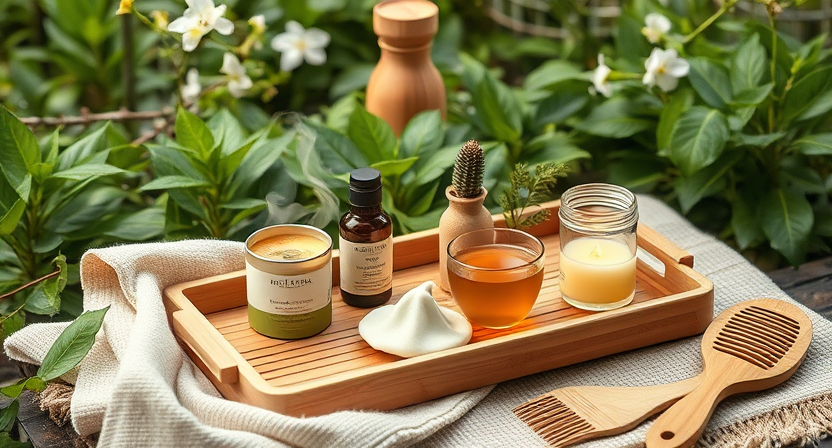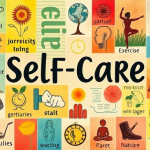
Eco-Friendly Self-Care: Sustainable Practices to Support Yourself and the Planet
Why Sustainable Self-Care Matters

Sustainable self-care matters because it not only benefits our own well-being but also has a positive impact on the environment. By choosing eco-friendly products and practices, we can reduce our carbon footprint and support the health of our planet for future generations. Prioritizing sustainability in our self-care routines allows us to align our personal values with actions that contribute to a more harmonious relationship with the natural world.
In a world where fast-paced living often leads to neglecting our own needs and the health of the planet, sustainable self-care serves as a reminder to slow down, be mindful, and make conscious choices that prioritize long-term wellness over temporary fixes. By incorporating sustainable practices into our self-care routines, we not only nurture our own mental, emotional, and physical well-being but also contribute to a broader movement towards a more environmentally conscious and socially responsible way of living.
Understanding the Connection Between Self-Care and the Environment

Self-care and the environment are intricately linked in a symbiotic relationship that influences our overall well-being. The choices we make in our self-care routines can have a lasting impact on the planet, from the products we use to the waste we generate. By opting for natural and non-toxic products, we not only prioritize our health but also reduce our environmental footprint by avoiding harmful chemicals that can seep into the earth and water systems. Additionally, by being mindful of the resources we consume and the waste we produce in our self-care practices, we can contribute to a healthier planet for current and future generations.
Moreover, practicing sustainable self-care allows us to align our personal well-being with the well-being of the planet. Choosing eco-friendly options and supporting ethical brands not only benefits our own health but also supports companies that prioritize sustainability and ethical practices. By incorporating mindfulness, meditation, and connecting with nature into our self-care routines, we can foster a deeper appreciation for the environment and cultivate a sense of interconnectedness with the natural world. This holistic approach to self-care not only nourishes our minds and bodies but also fosters a sense of responsibility towards caring for our planet.
Choosing Natural and Non-Toxic Products for Your Self-Care Routine

When it comes to selecting products for your self-care routine, opting for natural and non-toxic options can have a significant impact on your health and the environment. Traditional personal care items often contain harmful chemicals and additives that can be absorbed into your body and harm aquatic ecosystems when washed down the drain. By choosing natural alternatives, such as organic skincare, chemical-free soaps, and aluminum-free deodorants, you not only prioritize your well-being but also reduce your carbon footprint.
It’s essential to be mindful of the ingredients in the products you use daily, as many conventional options may contain substances that can disrupt hormone balance, cause skin irritation, or contribute to environmental pollution. By reading labels and choosing items with minimal, plant-based ingredients, you can support your body’s natural processes while minimizing your exposure to synthetic compounds. Making the switch to natural and non-toxic products for your self-care routine is a simple yet impactful way to promote both personal health and sustainability.
• Opt for organic skincare products to avoid harmful chemicals
• Choose chemical-free soaps to reduce environmental impact
• Use aluminum-free deodorants to prioritize your well-being and the environment
• Read labels and select items with minimal, plant-based ingredients
By making conscious choices in your self-care routine, you can contribute to a healthier lifestyle for yourself and the planet. Making the switch to natural and non-toxic products is a small change that can have a big impact on your overall well-being.
Reducing Waste in Your Self-Care Practices

Sustainable self-care extends beyond the products we use to nurture our bodies; it also encompasses the impact we have on the environment through our daily routines. Reducing waste in our self-care practices is a crucial step towards adopting a more eco-friendly lifestyle.
One way to minimize waste is by opting for reusable and refillable containers for your skincare, haircare, and bath products. Investing in high-quality containers that can be washed and refilled not only reduces single-use plastic waste but also saves money in the long run. By choosing products with minimal or recyclable packaging, you can significantly decrease the amount of waste generated from your self-care routine.
Exploring DIY Self-Care Recipes and Remedies

Crafting your own self-care products can be a fun and rewarding way to personalize your routine while reducing your environmental impact. From soothing bath salts to nourishing face masks, there are endless DIY recipes and remedies that can easily be made with natural ingredients found in your kitchen or local stores. By creating your own products, you have full control over what goes into them, ensuring that they are free from harmful chemicals and tailored to your unique needs.
Experimenting with DIY self-care recipes can also be a creative outlet that allows you to explore the benefits of natural ingredients and their healing properties. Whether you are blending essential oils for a calming massage oil or mixing up a batch of homemade lip balm, the possibilities are endless. Not only are these homemade products better for your skin and overall well-being, but they can also be a more sustainable option compared to store-bought alternatives packaged in plastic and laden with synthetic ingredients.
Supporting Ethical and Eco-Friendly Brands

When it comes to supporting ethical and eco-friendly brands for your self-care needs, it’s essential to look beyond just the products themselves. Consider the company’s overall ethos, values, and practices to ensure they align with your sustainability goals. Choose brands that prioritize transparency in their sourcing, production, and packaging methods to minimize their environmental impact and support fair labor practices.
Opt for companies that are committed to using natural, organic, and cruelty-free ingredients in their products. By selecting brands that prioritize sustainability and ethics, you are not only taking care of yourself but also contributing to a healthier planet and supporting businesses that are striving to make a positive difference in the world. Remember, your choices as a consumer have the power to shape a more sustainable and ethical future for the self-care industry.
Incorporating Mindfulness and Meditation into Your Self-Care Routine

Mindfulness and meditation are powerful tools that can enhance our self-care routines. By incorporating these practices into our daily lives, we can cultivate a greater sense of awareness and presence in the moment. Mindfulness allows us to tune into our thoughts, emotions, and physical sensations without judgment, fostering a deeper understanding of ourselves and our needs. Meditation, on the other hand, offers a space for relaxation and reflection, helping to calm the mind and reduce stress. When we prioritize mindfulness and meditation in our self-care routines, we create space for inner peace and rejuvenation amidst the demands of daily life.
Engaging in mindfulness and meditation can also help us build resilience and emotional intelligence, supporting our overall well-being. These practices encourage us to slow down, breathe deeply, and connect with the present moment, promoting a sense of balance and clarity. By taking the time to nurture our mental and emotional health through mindfulness and meditation, we equip ourselves with tools to navigate challenges and uncertainties with grace and composure. Incorporating these practices into our self-care routines empowers us to cultivate a deeper sense of self-awareness and compassion, fostering a sustainable foundation for overall wellness.
Connecting with Nature for Self-Care Benefits

Spending time in nature can be incredibly rejuvenating for both our physical and mental well-being. The simple act of immersing oneself in the natural world can help reduce stress, improve mood, and boost overall feelings of happiness. Whether it’s a leisurely walk in the park, a hike in the mountains, or simply sitting by a body of water, being in nature can provide a sense of peace and tranquility that is hard to find elsewhere.
Furthermore, connecting with nature allows us to unplug from the distractions of modern life and tune into the present moment. The sights, sounds, and smells of the outdoors can help us practice mindfulness and be fully present in the here and now. This grounding experience can help us gain perspective, reduce anxiety, and foster a sense of gratitude for the natural world around us.
Practicing Minimalism in Your Self-Care Approach

Incorporating minimalism into your self-care routine can be a refreshing and transformative approach to enhancing your overall well-being. By simplifying your self-care practices, you can focus on what truly brings you joy and fulfillment, allowing you to create a more intentional and mindful connection with yourself. Embracing minimalism in self-care means letting go of excess and unnecessary clutter in both your physical environment and mental space, giving yourself the opportunity to prioritize what truly matters to you.
Minimalism in self-care encourages you to cultivate a deeper sense of self-awareness and appreciation for the present moment. By decluttering your self-care rituals and surroundings, you can create a sense of calm and serenity that promotes relaxation and rejuvenation. This intentional approach to minimalism not only allows you to simplify your self-care practices but also helps you to foster a deeper sense of gratitude and contentment in your daily life.
Utilizing Reusable and Sustainable Self-Care Tools

When it comes to self-care practices, the tools and products we use can have a significant impact on both our well-being and the environment. Choosing reusable and sustainable self-care tools is a simple yet powerful way to reduce waste and lessen our ecological footprint. Investing in items such as bamboo toothbrushes, stainless steel razors, or silicone facial brushes not only helps to limit single-use plastics but also promotes long-term durability and efficiency in our self-care routines.
By incorporating reusable and eco-friendly tools into our self-care practices, we not only prioritize our own health but also contribute to the preservation of the planet. From refillable water bottles to cloth makeup remover pads, there are numerous options available that align with sustainable principles. Making conscious choices about the tools we use in our self-care rituals can lead to a more mindful and environmentally-friendly approach, benefiting both ourselves and the world around us.
Exploring Plant-Based and Cruelty-Free Options for Self-Care

When it comes to self-care, choosing plant-based and cruelty-free options can have a positive impact not only on your well-being but also on the environment. By opting for products that are derived from plants and are not tested on animals, you are not only taking care of yourself but also showing compassion towards other living beings. Plant-based ingredients such as essential oils, shea butter, and coconut oil can provide nourishment for your skin and hair without the use of harsh chemicals or animal by-products.
Exploring cruelty-free options for self-care can also align with your values of sustainability and ethical consumption. Supporting brands that prioritize ethical practices and environmental consciousness can contribute to a more sustainable future for both personal care and the planet. Additionally, by incorporating plant-based and cruelty-free products into your self-care routine, you can feel good knowing that you are making choices that are in line with your values and beliefs.
Creating a Relaxing and Eco-Friendly Self-Care Space

When creating a relaxing and eco-friendly self-care space, it’s important to consider the materials and items you bring into the space. Opt for furnishings made from sustainable materials like bamboo or reclaimed wood. Integrate natural elements such as plants, stones, or natural fibers to add a sense of tranquility and connection to the environment.
Incorporating eco-conscious lighting options, such as LED bulbs or solar-powered fixtures, can enhance the ambiance of your self-care space while reducing energy consumption. Choose non-toxic candles or essential oil diffusers for a calming scent that won’t compromise indoor air quality. By thoughtfully curating your self-care space with sustainability in mind, you can create a harmonious environment that nurtures both your well-being and the planet.
Engaging in Sustainable Practices for Mental Health and Well-Being

Engaging in sustainable practices for mental health and well-being is not just about taking care of oneself in the present moment but also ensuring long-term resilience and vitality. Incorporating practices like mindfulness meditation into your daily routine can help cultivate a sense of calm and presence amidst the chaos of everyday life. By dedicating even just a few minutes each day to quiet reflection, you can nurture your mental well-being and build inner strength that will sustain you through life’s challenges.
Another key aspect of sustainable mental health practices is prioritizing rest and relaxation. In a society that often glorifies busyness and productivity, it can be easy to overlook the importance of giving yourself permission to slow down and recharge. Setting boundaries around work hours, creating a calming bedtime routine, and allowing yourself moments of leisure without guilt are all essential for maintaining a healthy mind. Remember, taking care of your mental health is not a luxury but a necessity for sustainable well-being.
Prioritizing Rest and Sleep for Sustainable Self-Care

Rest and sleep are essential components of sustainable self-care practices. Adequate rest allows our bodies to recharge, repair, and rejuvenate, contributing to overall well-being and sustainable health. Lack of sufficient rest can lead to increased stress, decreased cognitive function, and compromised immune systems, highlighting the importance of prioritizing quality sleep for optimal self-care.
Incorporating restful practices into our daily routines, such as establishing a consistent sleep schedule, creating a calming bedtime routine, and eliminating distractions in the bedroom, can significantly enhance the quality of our sleep. By valuing rest and prioritizing adequate sleep, we not only improve our own physical and mental health but also contribute to a more sustainable lifestyle by reducing our reliance on stimulants and fostering a healthier environment for ourselves and those around us.
Finding Community and Support for Eco-Friendly Self-Care

Engaging in eco-friendly self-care practices can sometimes feel like a solitary journey, but finding community and support can make a significant difference. Connecting with like-minded individuals who prioritize sustainability and well-being can offer a sense of belonging and encouragement. Whether it’s through online forums, local sustainability groups, or eco-conscious events, building a community around eco-friendly self-care can foster a sense of camaraderie and inspiration.
Sharing experiences, tips, and resources within a community that values eco-friendly self-care can spark creativity and new ideas for sustainable practices. It provides a platform for exchanging knowledge and learning from others’ journeys towards more mindful and environmentally-conscious self-care routines. Being part of a supportive community can not only enhance one’s commitment to sustainable living but also offer a sense of solidarity in the collective effort to nurture both personal well-being and the health of the planet.
Balancing Work and Self-Care in a Sustainable Way

Achieving a harmonious balance between work responsibilities and self-care practices is essential for maintaining overall well-being. In today’s fast-paced world, it can be easy to prioritize work over self-care, leading to burnout and decreased productivity. However, by incorporating sustainable self-care habits into your daily routine, you can better manage stress and improve your mental and physical health.
One strategy for balancing work and self-care is to establish clear boundaries between work hours and personal time. Setting aside dedicated moments for self-care activities, such as meditation, exercise, or hobbies, can help recharge your energy and enhance productivity when it’s time to focus on work tasks. Additionally, practicing mindfulness throughout the day can increase self-awareness and promote a sense of balance between professional responsibilities and personal well-being.
Exploring Traditional and Indigenous Self-Care Practices

Traditional and indigenous self-care practices offer valuable insights into holistic well-being that have been passed down through generations. Incorporating these ancient rituals into your self-care routine can provide a deeper connection to nature and a sense of grounding in today’s fast-paced world. Practices such as smudging, herbal remedies, and mindfulness techniques can promote inner peace and balance, aligning with the principles of sustainability and respect for the environment.
By learning from traditional and indigenous self-care practices, individuals can cultivate a greater appreciation for diverse cultures and the wisdom they hold. These practices often emphasize the interconnectedness of all living beings and the importance of living in harmony with nature. By embracing these age-old traditions, individuals can not only enhance their own well-being but also contribute to a more sustainable and inclusive approach to self-care that honors the wisdom of the past.
Learning from Other Cultures and Their Sustainable Self-Care Rituals

When it comes to self-care practices, looking to other cultures can provide valuable insights into sustainable and holistic approaches. Different traditions around the world have long incorporated rituals that not only nurture the individual but also respect the environment. By exploring these diverse practices, we can gain a deeper understanding of how to prioritize well-being in a way that is mindful of our impact on the planet.
From Japanese forest bathing to Indian Ayurvedic rituals, each culture offers unique perspectives on self-care that emphasize harmony with nature and the interconnectedness of mind, body, and spirit. By drawing inspiration from these traditions, we can cultivate a more sustainable self-care routine that not only benefits ourselves but also contributes to the preservation of the environment. Embracing these practices allows us to tap into the wisdom of the past while adapting them to fit a modern ethos of conscious living and well-being.
Supporting Local and Sustainable Businesses for Your Self-Care Needs

When it comes to supporting local and sustainable businesses for your self-care needs, it’s essential to look beyond mainstream options and explore smaller, eco-conscious brands in your community. By choosing to purchase from these businesses, you not only invest in products that are better for the environment but also contribute to the local economy. Additionally, local and sustainable brands often prioritize ethically sourced ingredients and environmentally friendly packaging, aligning with your efforts to lead a more eco-conscious lifestyle.
Seeking out these businesses for your self-care essentials can also foster a sense of connection and community. Knowing the people behind the products you use can create a more personalized and meaningful experience. Building a relationship with local artisans and entrepreneurs not only supports their livelihood but also allows you to engage with the stories and values that shape the products you incorporate into your self-care routine. By investing in local and sustainable businesses, you not only care for yourself but also contribute to a more vibrant and eco-friendly community.
Continuing to Educate Yourself and Others on Sustainable Self-Care Practices

When it comes to sustainable self-care practices, education is key. By staying informed and continuously learning about eco-friendly options for self-care, we not only benefit ourselves but also contribute to a healthier planet. One way to educate yourself and others on sustainable self-care is by seeking out resources such as books, online articles, workshops, and community events that focus on the intersection of well-being and environmental consciousness.
Sharing your knowledge and experiences with others is another powerful way to spread awareness about sustainable self-care practices. Whether it’s through social media, discussions with friends and family, or participating in online forums and groups, engaging in open conversations can inspire and motivate others to adopt more mindful and eco-friendly approaches to self-care. Together, we can create a ripple effect that promotes positive change for both ourselves and the planet.











